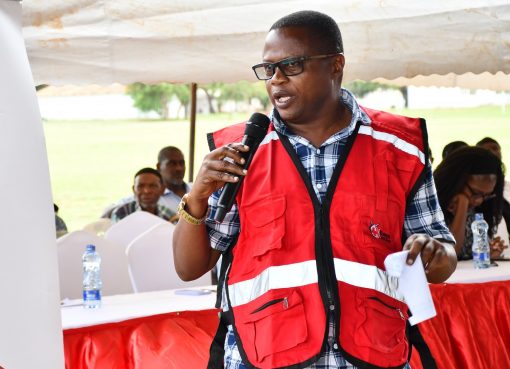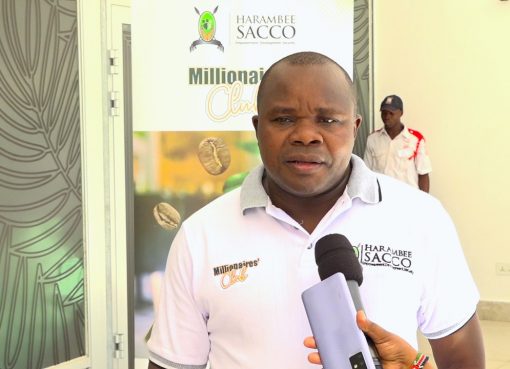The small but well-lit spacious room that houses the Hemophilia and Sickle-cell clinic at the heart of Moi County Referral Hospital in Voi in Taita-Taveta County is devoid of noise but a ray of hope to blood disorder patients.
Patients with the potentially deadly blood disorders come here for their survival. Standing along the wall is a locked five-foot fridge with a transparent door. Secured inside are a dozen white packets and two small bottles with clear liquid.
“A packet can go for as much as Sh 250,000. Depending on one’s condition, a patient might need as many as 14 or 15 packets per week,” explains Dr. Jeremiah Shem, a general practitioner in Taita-Taveta County with interest in Hemophilia.

The packets contain factor concentrates; life-saving substance intravenously administered to patients with Hemophilia condition.
Hemophilia is an inherited blood disorder, mostly from mother to their children, characterized by long episodes of bleeding. Patients lack a protein that triggers the clotting process. This condition which usually affects men can be fatal if not swiftly managed.
The Hemophilia Clinic at Moi County Referral Hospital is regarded as a major milestone by the Department of Health in the region in an effort towards promotion of access to Universal Health Care.
The clinic has also brought the much needed relief to Hemophilia patients and saved them a fortune spent while seeking medical help in hospitals in Nairobi and Mombasa.
Taita-Taveta currently has nine Hemophilia cases that are being managed at the clinic. Dr. Shem said there are more cases that have not been documented and thus a need to encourage people with such blood disorders to come out and be treated.
“There are many cases out there that we don’t know of. What we are urging is for all people with bleeding disorder to come out and get help,” he said.
Hemophilia occurs in one person for every 10,000. According to Kenya Hemophilia Association (KHA), there are approximately 750 known cases from 4,500 people living with the condition in Kenya.
The significant proportion of people who fear coming out publicly is attributed to stigma associated with a condition that is characterized by excessive bleeding.
Dr. Rebeccah Mwakichako, a medic who treats Hemophilia and sickle cell patients at the Moi Referral Hospital, said there is an urgent need to destigmatize Hemophilia to encourage more people to come out and seek treatment. She noted that the condition can be managed with blood clotting factors giving patients the best of their lives.
“This is one blood disorder not much known like other ailments. The public views and perceptions make it hard for people with such disorder to come out,” she explained.
As part of a campaign to increase the awareness on Hemophilia, doctors dealing with blood-disorders in Taita-Taveta County are establishing partnerships with churches and other religious groups to enhance monitoring of such conditions, especially when churches are conducting mass circumcision for boys who have come of age.
Mwakichako said the partnership will enhance medical assessment of young boys and eliminate the risk of conducting circumcisions on potentially hemophilic boys.

She noted that such partnerships would help the medics identify potential cases of interest. The initiative will also create more awareness of the condition amongst the church members.
“We can learn if there exists a history of prolonged bleeding in the family and thereby make necessary follow up,” she said.
Though still young, the hemophilic clinic at Moi County Referral Hospital, made history after conducting the first safe surgery circumcision for a hemophilic boy in the Coast region.
Dr. Shem, who oversaw the operation, said the young boy was traumatized by constant ridicule from other boys to an extent that he was mulling committing suicide. Dr. Shem disclosed that the operation went on well and the boy is now in high school.
“It was a big relief for everyone- the boy, his father and his family. We managed his condition throughout the process until he was well,” he said.
He added that with the arrival of Covid-19 vaccine, the medics were encouraging hemophilic patients and other people with blood disorders to receive their jabs from the facility to mitigate against the risk of excessive bleeding.
Dr.Shem noted that with the government’s push for Kenyans to get the vaccine against coronavirus, there was a mordant risk of hemophilic cases getting injected and triggering emergency bleeding thus the need to be injected in secure facilities.
“People are taking the injections, but those with bleeding disorders ought to do it from the facilities where the risk of bleeding excessively can be mitigated,” he said.
Other Hemophilia treatment centers are found at the Kenyatta National Hospital, Murang’a Level Five, Kisii Teaching and Referral Hospital and at the Coast General Hospital.
The efforts of the Moi County Referral Hospital Hemophilia clinic have not got unnoticed. Already, Kenya Hemophilia Association is exploring the possibility of upgrading the clinic into becoming a center of excellence for treatment and management of Hemophilia and other blood disorders in the region.
Once the clinic is upgraded, it will receive equipment for conducting blood analysis to determine the missing factor in a patient.
One of the major challenges in management of Hemophilia is the treatment cost. Currently, the factor concentrates available for use by Hemophilia patients are provided by donors.
Among the major donors are Novo Nordisk Hemophilia Association and World Federation of Hemophilia.
Mwakichako said the inherited blood disorders like Hemophilia and Sickle Cell remain the most expensive to manage.
“The Drugs and treatment is prohibitively high for patients who are financially challenged. The government should step in and make this treatment free,” she said.
There have been efforts to have the government through the Ministry of Health to pay more attention to Hemophilia and other inherited blood disorders.
In June 2019, nominated Member of Parliament (MP) representing Persons with Disability, David Ole Sankok, presented a petition in parliament seeking to have treatment of Hemophilia upgraded.
He argued that the blood clotting factors by donors only covered 30 per cent of the total amount needed by the 750 hemophilic patients which forced most patients to undergo expensive procedures, including blood transfusions.
He requested the Ministry of Health to recognize the factors as essential for hemophilic patients which would allow Kenya Medical Supplies Authority (KEMSA) to procure the life-saving product.
The MP asked the government to open more Hemophilia Treatment Centres and classify the condition as a disability for recognition by the National Council for Persons Living with Disabilities.
He called National Hospital Insurance Fund (NHIF) to cover the treatment of Hemophilia to ease the economic burden of the patient.
The government responded. In April last year, the Cabinet Secretary for Health, Mutahi Kagwe, formed The National Advisory Committee To Advice and Oversee The Supply and Utilization of Blood and Blood Products.
Amongst the gazetted names for committee members is a renowned Hematologist, Dr.Kibet Shikuku, who is the current Chief Executive Officer of KHA.
The Committee will hand over its final report this month. It is expected, amongst the recommendations, will be modalities and government interventions for the management of Hemophilia conditions.
By Wagema Mwangi and Janet Nyambura





